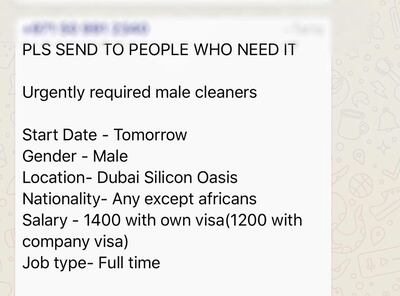Many companies still prioritise a candidate’s nationality over skillset – despite the threat of prosecution under anti-discrimination laws, recruiters said.
Several leading agencies told The National they had stopped working with employers who insist on hiring specific nationalities or genders.
The UAE has anti-discrimination and anti-hate speech laws with penalties in the hundreds of thousands of dirhams.
Companies could also fall foul of cybercrime laws that govern offensive content online.
“Sadly, discrimination in recruitment is a very real issue – and it’s usually because of personal bias or stereotypes of the hiring managers,” said Nevin Lewis, chief executive of Black and Grey, which recruits candidates for white-collar jobs.
He said even with laws in place, it is the employer’s responsibility to ensure the company has diversity.
Mr Lewis suggested that business leaders implement anti-discrimination recruitment policies and bring in a code of ethics to objectively hire top talent.
“UAE leadership has already emphasised tolerance and this should play a significant role in promoting equality within the workplace in the years to come,” Mr Lewis said.
The problem appears to persist across the job market, from low-pay unskilled work to professional roles.
Before changes to the law and to societal attitudes, adverts that were discriminatory were once common in some print outlets and on major job websites, with many seeking "only western expats", "attractive candidates" or "no head scarf".
Today, as major sites delete or bar such ads, they are largely restricted to WhatsApp groups and social media.
Speaking to The National previously, Dr Omar Al Nuaimi, assistant undersecretary at the Ministry of Human Resources and Emiratisation, said that "prejudicial discrimination has no place in the conditions of employment, nor in wider UAE society".
David Mackenzie, head of recruitment agency Mackenzie Jones Middle East, said his firm had stopped working with employers who insist on a certain nationality or gender.
“Don’t look at the passport, look at the individual,” Mr Mackenzie said.
“To make the UAE economy stronger, we need to hire very good people and those people don't necessarily come with a specific passport.
"You have to hire on attitude and skill rather than sex and nationality.
“If we don't do that, then we're never going to move the economy further forward. It's the same way of not having women on seats and boards – you need to have equality so you get diversity.”
There is a jail sentence of up to 10 years and fines of up to Dh2 million against employers who break the Anti-Discrimination Law, passed in 2015.
Article 13 of the law states that any person or group that manages an organisation that offends religion, or provokes discrimination or hate speech, will be held accountable.
After the huge disruption caused by the Covid-19 pandemic, the labour market in the UAE is slowly recovering.
Jobseekers are imploring employers to look at their skills and not at their passport, gender or age, as they try to find employment in these uncertain times.
Faisal Gul is a Pakistani engineer who has been searching for work in Dubai for nearly a year.
“I’ve given so many interviews, but I notice that it’s mostly the same race as the hiring manager that gets hired for the role,” said Mr Gul, who has a degree in electrical engineering and two years of workplace experience in his home country.
“Even if I do get hired, I’m worried my salary would be much less than some of the other nationalities.”


















